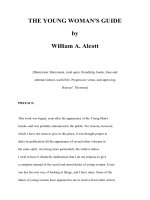THE YOUNG WOMAN''''S GUIDE pot
Bạn đang xem bản rút gọn của tài liệu. Xem và tải ngay bản đầy đủ của tài liệu tại đây (713.26 KB, 291 trang )
THE YOUNG WOMAN'S GUIDE
by
William A. Alcott
[Illustration: Retirement, rural quiet, friendship, books, Ease and
alternate labour, useful life, Progressive virtue, and approving
Heaven! Thomson]
PREFACE.
This work was begun, soon after the appearance of the Young Man's
Guide and was partially announced to the public. For reasons, however,
which I have not room to give in this place, it was thought proper to
defer its publication till the appearance of several other volumes in
the same spirit, involving more particularly the relative duties.
I wish to have it distinctly understood, that I do not propose to give
a complete manual of the social and moral duties of young women. Every
one has his own way of looking at things, and I have mine. Some of the
duties of young women have appeared to me to receive from other writers
less attention than their comparative importance demands; and others
especially those which are connected with the great subject of
"temperance in all things" I have believed to be treated, in several
respects, erroneously.
Permit me, however, to say, that while I have not intended to follow
the path, or repeat the ideas of any other writer, I have not attempted
to avoid either the one or the other. If I have presented here and
there a thought which had already come before the public from my own
pen, I can only say that I did not intend it, although I did not take
special pains to avoid it. The sum is this. I have presented my
thoughts, without so much reference to what has already been said by
myself or others, as to what I have supposed to be the necessities of
those for whom I write. I have gone straight forward, asking no
questions; and I trust I shall be dealt with in a manner equally
direct.
CONTENTS.
CHAPTER I. EXPLANATION OF TERMS.
Defining terms. The word excellence here used as nearly synonymous with
holiness. What is meant by calling the work a Guide. The term Woman
why preferable, as a general term, to Lady. The class to whom this work
is best adapted.
CHAPTER II. FEMALE RESPONSIBILITIES.
Comparison of the responsibilities of young men and young women. Saying
of Dr. Rush. Its application to young women. Definition of the term
education. Bad and good education. Opinions of Solomon. Influence of a
young woman in a family in a school. Anecdotes of female influence.
West, Alexander, Cæsar, Franklin. Story of a domestic in Boston. The
good she is doing. Special influence of young women in families and as
sisters. Female influence in the renovation of the world.
CHAPTER III. SELF-EDUCATION.
Views of Agesilaus, king of Sparta of Solomon, king of Israel. Mistake
corrected. What the wisest and best parents cannot do. What, therefore,
remains to the daughter. Necessity of self-education. The work of self
education the work of life a never-ending progress upward to the
throne of God.
CHAPTER IV. LOVE OF IMPROVEMENT.
Female capabilities. Doing every thing in the best possible manner.
Unending progress. Every person and every occupation susceptible of
improvement, indefinitely. Doing well what is before us. Anecdote
illustrative of this principle. Personal duties. Two great classes of
persons described. Hopes of reaching the ears of the selfish.
CHAPTER V. SELF-KNOWLEDGE.
Vast extent of the science of self-knowledge. Spurious self-knowledge.
Knowledge of our physical frame its laws and relations. Examples of
the need of this knowledge. Instruments of obtaining it. The use of
lectures. Study of our peculiarities. Study of mental philosophy. The
Bible. How the Bible should be studied.
CHAPTER VI. CONSCIENTIOUSNESS.
Is there any conscientiousness in the world? How far conscientiousness
should extend. Tendency and power of habit. Evils of doing incessantly
what we know to be wrong. Why we do this. Errors of early education.
False standard of right and wrong. Bad method of family discipline.
Palsy of the moral sensibilities. Particular direction in regard to the
education of conscience. Results which may be expected.
CHAPTER VII. SELF-GOVERNMENT.
What self-government includes. Cheerfulness a duty. Discretion.
Modesty. Diffidence. Courage. Vigilance. Thoughts and feelings. The
affections. The temper. The appetites and passions.
CHAPTER VIII. SELF-COMMAND.
Presence of mind. Examples. Napoleon. Female example. Mrs. Merrill. Use
of the anecdote. Self-command to be cultivated. In what manner. Consult
the experience of others. Consult your own reason and good sense. Daily
practice in the art of self-command.
CHAPTER IX. DECISION OF CHARACTER.
Decision of character as important to young women as to others. Why it
is so. Illustration of the subject by a Scripture anecdote. Misery and
danger of indecision. How to reform. Perseverance. Errors of modern
education.
CHAPTER X. SELF-DEPENDENCE.
Fashionable education. Why there is so little self-dependence in the
world. Why orphans sometimes make out well in the world. Error
corrected. What young women once were. What they are now. The best
character formed under difficulties. Cause of the present helpless
condition of females. Three or four to get breakfast. Modes of breaking
up these habits. Anecdote of an independent young woman. Appeal to the
reader.
CHAPTER XI. REASONING AND ORIGINALITY.
Females not expected to be reasoners. Effects of modern education on
the reasoning powers. Education of former days, illustrated by an
anecdote of an octogenarian. Extracts from her correspondence.
Difficulty in getting the ears of mankind. The reasoning powers in man
susceptible of cultivation indefinitely. Reflections on the importance
of maternal effort and female education.
CHAPTER XII. INVENTION.
Why woman has invented so few things. Abundant room for the exercise of
her inventive powers. Hints. Particular need of a reform in cookery.
Appeal to young women on this subject.
CHAPTER XIII. OBSERVATION AND REFLECTION.
Advice of Dr. Dwight. Other counsels to the young. Some persons of both
sexes are always seeing, but never reflecting. An object deserving of
pity. Zimmerman's views. Reading to get rid of reflection. Worse things
still.
CHAPTER XIV. DETRACTION AND SCANDAL.
Universal prevalence of detraction and slander. Proofs. Shakspeare.
Burns the poet. Self-knowledge, how much to be desired. Reference to
the work of Mrs. Opie to our own hearts to the Bible.
CHAPTER XV. THE RIGHT USE OF TIME.
Great value of moments. An old maxim. Wasting shreds of time. Time more
valuable than money. What are the most useful charities. Doing good by
proxy. Value of time for reflection. Doing nothing. Rendering an
account of our time at the last tribunal.
CHAPTER XVI. LOVE OF DOMESTIC CONCERNS.
Reasons for loving domestic life. 1. Young women should have some
avocation. Labor regarded as drudgery. 2. Domestic employment healthy.
3. It is pleasant. 4. It affords leisure for intellectual improvement.
5. It is favorable to social improvement. 6. It is the employment
assigned them by Divine Providence, and is eminently conducive to moral
improvement The moral lessons of domestic life. A well ordered home a
miniature of heaven.
CHAPTER XVII. FRUGALITY AND ECONOMY.
Economy becoming old fashioned. The Creator's example. Frugality and
economy should be early inculcated. Spending two pence to save one, not
always wrong. Examples of disregarding economy. Wasting small things.
Good habits as well as bad ones, go by companies. This chapter
particularly necessary to the young. Frugality and economy of our
grandmothers.
CHAPTER XVIII. SYSTEM.
General neglect of system in families. Successful efforts of a few
schools. Why the effects they produce are not permanent. Importance of
right education. Here and there system maybe found. Blessedness of
having a mother who is systematic. Let no person ever despair of
reformation. How to begin the work.
CHAPTER XIX. PUNCTUALITY.
Evil of being one minute too late. Examples to illustrate the
importance of punctuality. Case of a mother at Lowell. Her adventure.
General habits which led to such a disaster. Condition of a family
trained to despise punctuality.
CHAPTER XX. EXERCISE.
The muscles, or moving power of the body. Their number and character.
Philosophy and necessity of exercise. Why young women should study
these. Various kinds of exercise. 1. Walking. 2. Gardening and
agriculture. 3. House-keeping. 4. Riding. 5. Local exercises
Difficulty of drawing the public attention to this subject. The slavery
of fashion. Consequences of the fashionable neglect of exercise. A
common but shocking sight.
CHAPTER XXI. REST AND SLEEP.
Why rest and sleep are neglected. Sleep a condition. We should sleep in
the night. Moral tendency of not doing so. Is there any moral character
in such things? Of rest without sleep. Good habits is regard to sleep.
Apartments for sleep. Air. Bed. Covering. Temperature. Night clothing.
Advice of Macnish on the number of persons to a bed. Preparation for
sleep. Suppers. The more on indulge in sleep, the more sleep we seem to
require. The reader urged to study the laws of rest and sleep. An
appeal.
CHAPTER XXII. INDUSTRY.
Education to industry. Man naturally a lazy animal. Indolence in
females. Hybernation. Every young woman ought to be trained to support
herself, should necessity require it, and to aid in supporting others.
She should, at least, be always industrious. Kinds of labor, Mental
labor as truly valuable as bodily.
CHAPTER XXIII. VISITING.
Is there no time for relaxation? May there not be passive enjoyments?
Passive enjoyments sometimes wrong. How Christian visits should be
conducted. Duty and pleasure compatible. Passive visits useful to
childhood. Folly of morning calls and evening parties. Bible doctrine
of visiting. Abuse of visiting.
CHAPTER XXIV. MANNERS.
Miss Sedgwick on good manners. Her complaint. Just views of good
manners. Good manners the natural accompaniment of an good heart. The
Bible the best book on manners. Illustrations of the subject.
CHAPTER XXV. HEALTH AND BEAUTY.
Dr. Bell's new work on Health and Beauty. Its value. Adam and Eve
probably very beautiful. Primitive beauty of our race to be yet
restored. Sin the cause of present ugliness. Never too late to reform.
Opinion of Dr. Rush. An important principle. The doctrine of human
perfectibility disavowed. Various causes of ugliness. Obedience to law,
natural and moral, the true source of beauty. Indecency and immorality
of neglecting cleanliness.
CHAPTER XXVI. NEATNESS AND CLEANLINESS.
Reasons for discussing these topics. Every person should undergo a
thorough ablution once a day. Quotation from Mrs. Farrar. Two important
objects gained by cold bathing. Its value as an exercise. Various forms
of bathing. Philosophy of this subject. Vast amount of dirt
accumulating on the surface. Statement of Mr. Buckingham. Bathing
necessary in all employments. Offices of the skin, and evil
consequences of keeping it in an uncleanly condition.
CHAPTER XXVII DRESS AND ORNAMENT.
Legitimate purposes of dress as a covering, a regulator of
temperature, and a defence. Use of ornaments. Further thoughts on
dress. How clothing keeps us warm. Errors in regard to the material,
quality, and form of our dress. Tight lacing its numerous evils.
Improvement of the lungs by education. Objections to the use of
personal ornaments.
CHAPTER XXVIII. DOSING AND DRUGGING.
Tendency of young women to dosing and drugging. "Nervousness." Qualms
of the stomach. Eating between our meals its mischiefs. Evils of more
direct dosing. What organs are injured. Confectionery. The danger from
quacks and quackery.
CHAPTER XXIX. TAKING CARE OF THE SICK.
The art of taking care of the sick should be a part of female
education. Five reasons for this. Doing good. Doing good by proxy.
Great value of personal services. How can young women be trained to
these services? Contagion. Breathing bad air. Aged nurses. . Scientific
instruction of nurses. Visiting and taking care of the sick a religious
duty. Appeal to young women.
CHAPTER XXX. INTELLECTUAL IMPROVEMENT.
Futility of the question whether woman is or is not inferior to man.
Conversation as a means of improvement. Taciturnity and loquacity.
Seven rules in regard to conversation. Reading another means of mental
progress. Thoughts on a perverted taste. Choosing the evil and refusing
the good. Advice of parents, teachers, ministers &c. Advice of a choice
friend. Young people reluctant to be advised. Set hours for reading.
Reading too much. Reading but a species of talking. Composition. Common
mistakes about composing. Attempt to set the matter right.
Journalizing. How a journal should be kept. Music. Vocal music
something more than a mere accomplishment. Lectures and concerts.
Studies. Keys of knowledge.
CHAPTER XXXI. SOCIAL IMPROVEMENT.
Improvement in a solitary state. The social relations. Mother and
daughter. Father and daughter. Brother and sister. The elder sister.
Brethren and sisters of the great human family. The family
constitution. Character of Fidelia. Her resolutions of celibacy. In
what cases the latter is a duty. A new and interesting relation.
Selection with reference to it. Principles by which to be governed in
making a selection. Evils of a hasty or ill-judged selection.
Counsellors. Anecdote of an unwise one. Great caution to be observed.
Direction to be sought at the throne of grace.
CHAPTER XXXII. MORAL PROGRESS.
Importance of progress. Physical improvement a means rather than an
end. The same true of intellectual improvement. The general homage
which is paid to inoffensiveness. Picture of a modern Christian family.
Measuring ourselves by others. Our Saviour the only true standard of
comparison. Importance of self-denial and self-sacrifice. Blessedness
of communicating. Young women urged to emancipate themselves from the
bondage of fashion, and custom, and selfishness.
THE
YOUNG WOMAN'S GUIDE.
CHAPTER I.
EXPLANATION OF TERMS.
Defining terms. The word excellence here used as nearly synonym with
holiness. What is meant by calling the work a Guide. The term Woman
why preferable, as a general term, to Lady. The class to whom this work
is best adapted.
It has been said, and with no little truth, that a large proportion of
the disputes in the world might have been avoided, had the disputants
first settled the meaning of the terms they respectively used. In like
manner might a large share of the misapprehension and error in the
world be avoided, if those who attempt to teach, would first explain
their terms.
This work is called "The Young Woman's Guide to EXCELLENCE," because it
is believed that excellence, rather than happiness, should be the
leading aim of every human being. I am not ignorant that happiness
present and future is proposed as our "being's end and aim," not only
by as distinguished a poet as Alexander Pope, but also by as
distinguished a philosopher as William Paley. But these men did not
learn in the school of Christ, that our "beings end and aim" is
happiness, present or future. The Christian religion, no less than
Christian philosophy and sound common sense, teaches that holiness or
excellence should be the leading aim of mankind. Not that "the
recompense of reward," to which the best men of the world have had
regard in all their conduct, is to be wholly overlooked, but only that
it should not be too prominent in the mind's eye, and too exclusively
the soul's aim; since it would thus be but a more refined and more
elevated selfishness. Real excellence brings happiness along with it.
Like godliness which, indeed, is the same thing it has the promise of
the life that now is, and of that which is to come. And that happiness
which is attainable without personal excellence or holiness, is either
undeserved or spurious. The world. I know, very generally seek after
it, whether deserved or undeserved; and whether willing or not to pay
the price.
My object is to assist, if I can, in removing from our world the error
of seeking happiness as a primary object. Let us but pursue excellence,
and happiness will almost inevitably follow. I address this exhortation
to Young Women, in particular, for reasons which will be seen when I
come, in the next chapter, to speak of female responsibilities. Let
every young woman aspire to high degrees of purity and excellence. Let
her great aim be, to be personally holy like God her Saviour. To this
end and with this aim, let her be ready to set aside, if necessary,
father and mother, and brother and sister yes, and her own life also,
assured that if she does it with a sacred regard to God and duty, all
will be well. Let her but follow Christ according to the gospel plan,
if it lead her to prison and to death. But it will not thus lead her.
For every self-denial or self-sacrifice it involves, she will secure,
as a general rule, manifold more in this present life, and in the world
to come, life everlasting.
This book is not called "The Young Woman's GUIDE," with the expectation
that she will consider it her only or even her principal guide. The
Bible should be the principal guide of every person, young or old, male
or female. Parents, also, are invaluable as guides. I offer it only as
the best guide which my reflections upon those subjects, connected with
the welfare of young women, that come within the department of my study
and observation, enable me to give. May it prove a guide indeed!
I have called it "The Young WOMAN'S Guide," because there are many who
are accustomed to associate with the word lady; the idea of exemption
from labor, and of entire devotion to something supposed to be above
it as fashionable company, or fashionable dress and equipage. And not
a few can hardly hear the word mentioned without disgust. Miss Sedgwick
has illustrated this part of my subject very happily in the first and
fifteenth chapters of her "Means and Ends." She says she does not write
exclusively for those who are termed young _ladies;_ because she
does not believe in any such fixed class, in the country. The term
_lady_, she also says, is too indefinite for any valuable use. We
not only apply it to those who are, or would be, above labor, but in a
great many other ways as that "old lady," meaning, perhaps, some
beggar at the door, &c.
In short, she does not like the use of the phrase, young lady, at all.
Neither do I. Besides, I like best the good old fashioned term, YOUNG
WOMAN. This exactly represents the class for whom I write, and that,
too, without either explanation or qualification. It will be mistaken
by no one, nor will it be likely to give or cause any offence.
Finally, I call the work "The YOUNG Woman's Guide," because I design it
for those single persons of the female sex to whom the term young is
usually applied; viz., those who are from twelve or fourteen to
eighteen or twenty years of age and to those, in general, who are
single. I hope, nevertheless, that it will contain some thoughts which
may be useful to those individuals who are in married life, as well as
to those who are below the age of twelve years. Many of its suggestions
and principles will, indeed, be applicable so far as they are just or
true to all mankind.
CHAPTER II.
FEMALE RESPONSIBILITIES.
Comparison of the responsibilities of young men and young women. Saying
of Dr. Rush. Its application to young women. Definition of the term
education. Bad and good education. Opinions of Solomon. Influence of a
young woman in a family in a school. Anecdotes of female influence.
West, Alexander, Cæsar, Franklin. Story of a domestic in Boston. The
good she is doing. Special influence of young women in families and as
sisters. Female influence in the renovation of the world.
Much has been said, within a few years, of the duties,
responsibilities, &c., of young men, especially the young men of our
republic. A great deal that has been said, has, in my view, been
appropriate and well-timed. My own attention has been frequently turned
to the same class of individuals; nor do I regret it. My only regret
is, that what I have said, has not been said to better purpose.
Counsels and cautions to young men, standing on slippery places as they
confessedly do, can hardly be too numerous, provided those who give
them, use discretion, and remember their responsibility, not only to
the tribunal of public opinion, but to a tribunal still higher.
The snares, the dangers, the difficulties, the influence, the
responsibilities of young men at least in the United States can
hardly be overrated. Would that they could be so trained and directed
as fully to understand them, and govern themselves accordingly! Would
that they could be made to exert that moral influence in the salvation
of our race politically no less than morally, nationally no less than
individually of which they are so capable.
Yet, after every concession of this kind, I am compelled to believe
that the responsibilities and influence of young women to say nothing
at present of their dangers are much more weighty than those of young
men. I am decidedly of opinion, that the future holiness and happiness
of the world in which we live, depend much more on the character of the
rising generation of the female sex, than on the character of our young
men.
It was said by Dr. Rush, long ago, that mothers and school-masters
plant the seeds of nearly all the good and evil in our world.
Presuming that by school-masters he meant teachers of both sexes, will
any one doubt the truth of his assertion? Will any one doubt the
justness of a remark in the late "Western Review," that if this world
is ever to become a better and a happier world, woman must be foremost,
if not the principal agent in rendering it so?
But as mothers are never mothers till they have been daughters, is it
not obvious that the right education of these last is as great a work
as any to which human mind and human effort have ever been called? If
woman moves the world, intellectually, morally, and even, in effect,
politically as no doubt she does is it not of primary importance that
she be taught, as well as teach herself, to move it right?
Can it be necessary to advert, in this place, to the well known and
acknowledged fact, that almost every man of extensive influence, for
good or for evil, whom the world has produced, became what he was
through maternal influence? Cæsar, and Caligula, and Talleyrand, and
Napoleon, became what they were in consequence of their mothers, no
less than Alfred, and Doddridge, and Howard, and Washington. For let it
not be forgotten that mothers and teachers, according to Dr. Rush and,
in fact, according to common observation, too plant the seeds of the
world of evil no less than of the world of good. How exceedingly
important, then, that _they_ should be well educated, "from whom,"
in the language of another writer, "our virtues are, and from whom our
vices may be" we would add _must_ be "derived;" at least in no
small proportion!
But I am using the term education without explaining it. Let me, then,
ere I proceed to say more on the subject of female responsibility,
explain what I mean by education, especially female education.
Mere instruction in the sciences is, indeed, education; it is, however,
but a very small part of it. To educate, is to train up. In this view,
all are of course educated; and every thing which has an influence in
developing mind or body, and in training up, either for good or for
evil, is entitled, justly, to the name of education.
But if the above definition be just if whatever concerns our
development, or the formation of any part of our character, physical,
intellectual, social or moral, is education then it must follow that
there are two kinds of education, bad and good. All persons, places and
things, which affect us (and what does not affect us?) and influence
us, for good or for evil, must educate us.
I am aware that this definition is not new: still, it is not generally
received, or if received, not generally acted upon. There is still an
almost universal clinging to the old, inadequate, incorrect idea, that
the principal part of education consists in the cultivation of the
intellect; and that, too, by set lessons; received, for the most part,
at the schools. The true idea of education, therefore, must be
continually enforced, till it becomes common property, and until
mankind act as if they believed what they profess in regard to it.
When Solomon says, "Train up a child in the way he should go," he is
talking of what I call _education;_ and the kind of education
which he is there recommending, is _good_ education. I do not
believe he had the schools in his mind the infant school, the Sabbath
school, the common school, the high school, or the university.
Far be it from me to attempt to detract from the value of our schools;
on the contrary, I regard them as of inestimable worth, when duly
attended to. What I insist on is, that they are not the _all in
all_ of education; and that, in fact, their influence in training up
or forming good character, is so trifling that is, comparatively that
they scarcely deserve to be thought of when speaking of education, as a
whole, especially the education of daughters. And though one of the
tribes of the nation to which Solomon belonged, over which he reigned,
and for whom, in particular, he wrote, is said to have been school-
masters by profession, and another priests, I can hardly conceive that
when he was inspired to give the educational advice just alluded to, he
ever turned so much as a thought to the little corner of Palestine
allotted to Simeon, or to the Levites in their respective but more
scattered stations.
Solomon was, in all probability, addressing himself chiefly to the
fathers and mothers, and grand-fathers and grand-mothers, and other
relatives of Israel; the class who, by their united influence, make the
son and daughter, and grand-son and grand-daughter, what they are a
blessing or a curse to the world in which they are to live. For,
according as children are brought up by these teachers, and by the
influences which are shed upon them from day to day and from hour to
hour, so are they well or ill educated.
If I have been successful in presenting the meaning of a term which is
not only frequently used in this book, but almost every where else, it
will follow, as a matter of course, that I do not attach too much
importance to the education of daughters themselves, nor to their
education as the teachers of others. For if to educate, is to form
character, what young woman can be found, of any age or in any family,
who is not a teacher?
Have young women often considered daughters, especially how much they
influence younger brothers and sisters, if any such there are in the
family where they dwell? Have they considered how much they sometimes
influence the character and how much more they might do it not only
of their school-mates and play-mates, but also of their more aged
friends and companions their parents, grand-parents, and others?
[Footnote: On reading these paragraphs in manuscript, to one of our
more eminent teachers, he observed that if he had been useful in the
world, he owed his usefulness to the exertions of a maiden lady who
resided in his father's family, while his character was forming.]
I could tell them were this the place for it many a true story of
reading daughters who have been the means of awakening, in their aged
parents, or grand-parents, or other friends, a taste for reading, which
they might otherwise have gone down to the grave without acquiring. I
could tell them of many a father and mother, and grand-father and
grand-mother, grown grey in vice hardened even by intemperance as well
as other vices who have been reformed by the prattle, or the reproof,
or the prayers of a good daughter. Is not such a daughter a teacher?
But I am most anxious to convince young women of their responsibilities
in regard to the rising generation, especially their own brothers and
companions. I am anxious, if I can, to convince all who read this
volume, that God has, by his providence, committed to their charge, in
no small degree, the bodies, and minds, and the souls of those with
whom, in this world, they are associated. That according to their own
conduct, good or ill, will be, in no small measure, the health, and
knowledge, and excellence of their friends and companions. That
according to their efforts attended, either by the blessing of God, or
the tokens of his displeasure will be the condition of millions, for
time and for eternity.
But is it so? Are daughters, as daughters merely to say nothing, as
yet, of maternal influence are daughters thus influential? Is it true
that the destiny of millions is thus committed to their keeping?
I have seen the conduct of a whole school I speak now of the common or
district school graduated by the conduct of a single virtuous, and
amiable, and intelligent young woman, not twelve years old, who
attended it. I have seen a whole Sabbath school not a little affected
by the prompt attention, decorous behaviour and pious example of some
elder member of an older class, to whom the younger members of classes,
male and female, looked up, as to a sort of monitor, or I know not what
to call it for the impression thus made, is better seen and felt than
described. The bad behaviour of a young woman, in these circumstances,
is, indeed, equally influential nay, more so, inasmuch as the current
of human nature sets more readily downward than upward. Still, a good
example is influential greatly so: would that it were generally known
how much so!
Suppose now that by your good behaviour and pious example in the
Sabbath school, you are the means of turning the attention of one
younger companion, male or female, to serious things, and of bringing
down upon that young person the blessing of Almighty God. Suppose that
individual should live to teach or to preach, or in some other form to
bless the world, by bringing numbers to the knowledge, and love, and
inculcation of the very truth which has saved his own soul and these
last, in their turn, should become apostles or missionaries to others,
and so on. Is there any end, at least till the world comes to an end,
of the good influence which a good Sabbath school pupil _may_ thus
exert?
But this is something more than a supposed case. Is it not, in effect,
just what is actually taking place around us in the world continually?
Not, indeed, that a long train of good influences has been frequently
set agoing in the Sabbath school for Sabbath schools are but of recent
origin. But people have always been led along to virtue or vice, to
piety or impiety, to bless the world or to prove a curse to it, by one
another. A word or a look from a relative, or friend, or acquaintance,
in the school or somewhere else, has often given a turn to the whole
character. A word, it is said, may move a continent. Something less
than a word a look or a smile of approbation may move more than a
continent. It may move not merely a West, [Footnote: A mother's kiss,
in token of her approbation of some little pencil sketch, is believed
by Benjamin West to have given the turn to his character the character
of a who said, and justly, that he painted for eternity. "That mother's
kiss," he observes, "made me a painter."] but an Alexander, a Cæsar, a
Napoleon, a Washington and a Howard men who, in their turn, moved a
world!
I have spoken of the influence which a young woman may have on millions
through the medium of the Sabbath school. But if she may influence in
this way, the millions of those who are to come after her, how much
more may she do in forming character for the great future, in the
family! Her presence in the Sabbath school is only once a week an hour
or two a day, once in seven days; whereas, her influence in the family
is going on perpetually.
The clothes of Alexander the Great, are said to have been made, to a
very great extent, by his sisters; and those of Augustus Cæsar were
made for many years, by his. And can we doubt that these young females
were influential, in a great many respects, in the education of these
conquerors? What could the latter have done, but for the assistance and
influence of mothers and sisters? And can we have any Alexanders and
Cæsars, at the present day, to carry on the moral and intellectual
conquests which are so necessary in the world, without the aid and co-
operation of mothers and sisters?
Sisters little know it is almost impossible for them ever to know how
much they do to bring about results, to educate their brothers and
friends, for the work which they perform, whether good or evil. The
sisters of Franklin little knew what they were doing for "young Benny,"
as they called him, while they assisted their mother in taking care of









